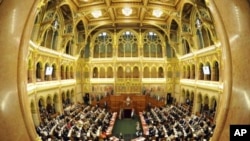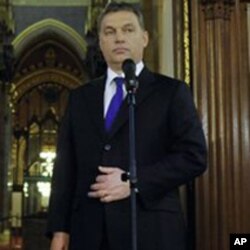Hungary's government says it has received a letter from U.S. Secretary of State Hillary Clinton in which she reportedly expresses concerns about a perceived crackdown on democratic freedom in the country, more than two decades after Hungary threw out the Communist regime. The letter arrived just days after the European Commission urged Hungary to withdraw legislation that critics claim will lead to a government takeover of the Central Bank.
Clinton's letter
In a letter to Hungarian Prime Minister Viktor Orban, U.S. Secretary of State Hillary Clinton reportedly expresses concerns about the future of democratic institutions in this former communist nation. A spokesman declined to confirm the letter's contents, reported by Hungarian media, but Clinton told reporters earlier this year in Budapest that essential checks and balances must be strengthened.
"As friends of Hungary, we expressed our concerns and particular call for a real commitment to the independence of the judiciary, a free press and governmental transparency," she said.
Clinton referred to attempts by Prime Minister Orban's center-right government to place allies at the helm of almost all previously independent national institutions.
The government introduced a tough new media law that critics claim muzzle's the country’s press and more recently reduced power of the constitutional court and revamped the judiciary by sending key judges to early retirement.
New policies
There is concern that future generations will not be able to change these policies under a new controversial constitution that takes effect January 1.
This prompted European Justice Commissioner Viviane Reding to express her concerns to Hungary's government, says her spokesman Matthew Newman.
"The commission fully respects member states' rights to make changes to their national constitutions," said Newman. "It is the commission's role as a guarder of the treaties to ensure that member states are implementing legislation that is in conformity with the treaties. So in this context Vice President Reding raised a number of concerns, in particular the obligation to have an independent data protection authority and as I mentioned the age discrimination concerning judges."
Additionally, Jose Manuel Barroso, the chief of the EU's executive branch, the European Commission, expressed concerns in a letter to the prime minister about two bills, including one that some think could threaten the independence of Hungary’s Central Bank.
Central Bank bill
European Commission spokesman Olivier Bailly says "European Commission President Barroso asked for the bills to be withdrawn because he is concerned that they might contravene with the treaty" of the European Union.
Critics claim the Central Bank bill, which was expected to be adopted Friday, will lead to a government takeover as it will enlarge the Monetary Council and the number of deputy governors.
The criticism has prompted the International Monetary Fund and the EU to halt talks with Hungary on a safety net the government is requesting of some $26 billion as the country copes with the highest debt in the region, some 80 percent of Gross Domestic Product.
Prime Minister Orban rejects the European Commission's criticism.
Orban says he told President Barroso "that there was no possibility to delay [the laws] as Hungary's Constitution will take effect on January 1, and both laws are important bricks in the new constitutional order."
Yet, Western concerns over Orban's perceived autocratic and nationalistic policies have spread to the streets of Budapest.
Hungarian police scuffled with protestors and detained dozens of activists. They included legislators who chained themselves at an entrance of the Hungarian parliament.
Among those detained was also former Socialist Prime Minister Ferenc Gyurcsany.
Speaking to reporters outside the police station, he says protests continue.
"Today there are the Socialists, tomorrow the 'Politics Can Be Different Party' and there will be other organizations." Gyurcsany says Hungarians have no other choice because "it is impossible to live with Prime Minister Orban." And, in his words, “Orban’s autocracy can no longer tolerate even peaceful opposition and protests.”
Orbanistan
Elsewhere journalists are on a hunger strike to protest alleged government interference in national news programs. Two of them have since been fired at the state-run broadcaster.
And, Hungary's main opposition radio station, Klubradio, has been told by the government-backed media authority that its broadcasting license will not be renewed. It was viewed as one of the last broadcasting voices of opposition parties that face an uphill battle to reclaim parliament because of controversial election legislation.
Investors are also concerned after banks were forced to take massive losses on foreign-currency loans, a controversial banking tax was introduced and companies were also required to pay a 'crisis tax' to help overcome the budget deficit.
Amid the turmoil, credit rating agency Standard & Poor's downgraded the country's debt to the non-investing junk status, following a similar move by the Moody's agency.
Yet, political analyst Peter Kreko of Budapest-based research group Political Capital isn't surprised about the perceived harsh policies of Orban’s government.
"The problem right now is that conspiracy theories became the core points of the government's ideology," said Kreko. "The way they see the current situation in Hungary is that everybody, even the international financial institutions and even the international political institutions such as the European Union want to chase away Viktor Orban."
It is a far cry from the days when, in 1989, Orban as a young man called publicly for the withdrawal of Soviet troops from then communist Hungary. Critics call Hungary 'Orbanistan', in reference to autocratic states in Central Asia.
Analysts caution however that the country is still a member of the EU and will therefore be under pressure to maintain some level of democracy.
Yet with Hungary increasingly isolated, there is concern about more political and social tension in the country, which joined the EU in 2004 along with 10 other mainly former Communist nations.





